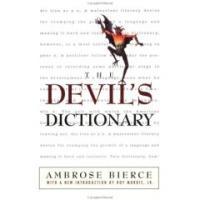
The Devil's Chess Companion
Here is my own Satire of Satires, an homage to Ambrose Bierce's brilliant work, The Devil's Dictionary which contained comical (and cynical) definitions of commonplace words.
Analysis- A language with no known native speakers. Like French, many people speak it with some degree of proficiency, but most just slap together a few sloppy phrases.
Bishop- Just as a Bishop in real life is worth exactly three times a normal person, a Bishop on the board is worth three times as much as a pawn.
Blunder- The wrapping paper of victory.
Brilliance- The leading cause of victory, according to the victor.
Chess- An ancient and addicitve game where to players of self-abusive temperment, elect to sit across from one other until a result is achieved. It is unkown who created it, but the authoraties are still looking.
Chess Prodigy- A child who displays any aptitude for the Game of Kings. The amount of press coverage, fame and opportunities a prodigy receives is directly proportional to the media savvy of the parents, and cuteness of the child. If Shirley Temple had been a chess prodigy, many people would have been very surprised.
Corus– A major chess tournament known as the Wimbledon of chess, though no one has ever gotten whiplash trying to follow a game at this Wimbledon. It was also called Wijk Aan Zee…Once. No one has been able to pronounce this since and they soon even gave up trying.
Draw- What happens when both players, having played so poorly that neither may win, leave the board in disgust.
Endgames- Where the dull destroy the weak with the mundane.
Fish- The first evolutionary step of the chess player after leaving the primordial ooze that is Patzerdom. Characterized by increased knowledge, improved vision, the ability to think ahead and gills. It was though to have gone extinct around 1600 Elo.
French Defence- Retreat, give up or surrender. Rarely played today at the highest level.
Gambit- Giving up material for positional compensation. From Gambetto, Italian for, “Tripping up of the heels.” Actually tripping your opponent would probably work better, especially at the top of a flight of stairs.
Gambit, King's- Give up the King, not a very good opening. Unless you're American, Australian etc...
Luck- The leading cause of victory, according to the loser.
Novelty- A move already played by someone, somewhere, often an obscure skittles game years ago where the moves were sadly, in fact woefully, not recorded. May have also been played in a back-water tournament no one's ever heard of, found in analysis and saved up for the right moment or in a game against their beloved uncle the first time they picked up a piece.
Passed Pawn- A vicious felon and con-man who has swindled many a player better than yourself. Methods of dealing with these criminals are many, and the debate is fierce. Some, like the esteemed Nimzovich, call for imprisonment as a sufficient punishment, but others, like the eminent Neimzowitsch say they must be quickly put to death.
Patzer- A chess player who has an active life outside of chess; anyone weaker than the user of the word.Pawn- The most worthless piece on the board. It is also used as a name for someone who is manipulated unknowingly, which is unfair, it should be used for people who follow even the worst orders blindly and without question. But then again, there’s already a number of names for Democrats.
Perpetual Check– See Threefold Repetition, Draw by.
Rapid Chess- The best kind because it ends the soonest.
Scandinavian Defence- Rape and pillage relentlessly at the beginning of the game to get it all out of your system, then create an obsessively clean and orderly society where you can eat off the side walks.
School of Chess, Hypermodern- A body of thought that claimed that the centre could and should be controlled by pieces in lieu of pawn encroachments. "The immunity of these person from swift and awful death is one of the many proofs of God's infinite mercy towards those who hate him." -Siegbert Tarrasch (By way of translator Ambrose Bierce).
School of Chess, Romantic- A mode of chess thought that emphasizes the belief that chess should be used to attract the opposite sex (See School of Chess, San Franciscan for an alternative style). Instead of shaking hands, a rose is given, before a piece is killed, it is kissed, and positions of mate are generally reached much quicker.
School of Chess, Scientific- A group of old men in the 19th century who thought chess was becoming to much fun. They aimed to rectify this by playing in such a slow, dull way so that adolescent chess players would give it up for the exciting world of The Antiques Road show.
Short Draw-A Russian invention, made to appeal to the proletariat. Inspired by the Russian public’s short attention span and love of deadlocks (See Cold War) it has been adopted by many top players from around the world, leading to incredible popularity among the chess playing public.
Sofia Rules- A controversial rule used in certain tournaments, including the annual tournament held in Sophia, that states that no player may offer a draw without special permission from the arbiter. The punishment for breaking this rule, they will have to stay in Sophia, and no one wants that.
Strategy– A plan created during the post mortem to explain why one player blundered the game away.
Swindle– The method by which you win a game, already won according to your opponent.
Tempo- Italian for money.
The Cynic's Hypothesis- Derived through the use of the definitions of "Luck" and "Brilliance", this equation states that Luck=Brilliance. The man who presented this groundbreaking hypothesis not only won the 1972 Nobel Prize for Mathematics, but was torn apart by a mob of drunken Chess fans, and, oddly enough, a dozen or so English Football fans who, "Had nothing better to do."
Threefold Repetition, Draw by- See Perpetual Check, Draw By.
World Champion of Chess - One, who, by virtue of their incredible skill, hard work, intelligence, determination and a life time of dedication, climb The Everest of Chess. The Everest of Chess is a small peak in Eastern Europe held in low regard by much of the world, who are confused as to why anyone would bother with it.
Comments and criticisms welcome and encouraged.






